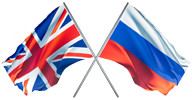The former Soviet Union leader Michael Gorbachev told to the agency RIA Novosti this week that “I think the world has reached a dangerous point,” and completed “I don’t want to give any concrete prescriptions but I do want to say that this needs to stop. We need to renew dialogue. Stopping it was the biggest mistake.”.
Mr. Gorbachev is absolutely right in his assessment, the escalating tensions between the parties involved in the Syrian conflict are, indeed, extremely dangerous. The cessation of dialogues between US and Russian Governments and the statement made by the UK Foreign Secretary Boris Johnson come in a very critical moment.
Both John Kerry call to Russia to be investigated by war crimes over the alledged attack on Aleppo humanitarian convoys, without presenting any evidence that it was actually executed by any Russian or Syrian aircraft, as well as the response from Moscow that it will shootdown Western aircraft in Syria, are signs of an extremely deteriorated situation and a dangerous sign that the conflict is moving to the opposite direction of that expected after the initial discussed cease-fire agreement reached between Lavrov and Kerry lately last month.
Vladimir Putin also pulled out of and arms-control agreement aimed at reprocessing weapons-grade plutonium and demanded the US roll back its military commitment to NATO members in eastern Europe, saying that expansion of the alliance had threatened Russian security.
Frank-Walter Steinmeier, German foreign minister, last week warned that “it’s a fallacy to think that this is like the Cold War. The current times are different and more dangerous.”. This statement is correct, I would say that the current situation in Syria is almost as close as the Cuban Missiles Crisis of October, 1962.
In an emergency House of Commons debate on Tuesday (11), the UK Foreign Secretary Boris Johnson called for those responsible for strikes on the convoy and hospitals in Aleppo to face trial at the International Criminal Court, affirming that Russia risked becoming a “pariah” state, he told MPs the UK government was “taking the lead” in raising awareness of the situation in Syria. Among his statements, Johnson called on the involvement of protesters: “I would certainly like to see demonstrations outside the Russian embassy”.
To call for demonstration or protests in front of embassies are not the role of any Foreign Affairs Minister, opinion that I share with the French foreign minister Jean-Marc Aryault that said to journalists: “Is it the job of a foreign minister to organise demonstrations?”. Boris Johnson comments were extremely unhappy , out of context and, considering his track record on statements, should not be taken seriously. He has to remember that the role of a diplomat is to call for negotiations. Hopefully Germany and France, also members of the UNSC, will face the whole situation in a more serious way.
The UNSC and the UN mandate should be invoked by its members, in order to involve all the parties under the necessary conciliatory forum to reach an agreement on this conflict. Any unilateral action from any of the parties will just fuel even more the conflict and, considering the latest bold statements, not reach any reasonable solution.
Our leaders should hear the experient voice of Mr. Gorbachev, and let the reason talk louder here.
BY GUILHERME SCHNEIDER


